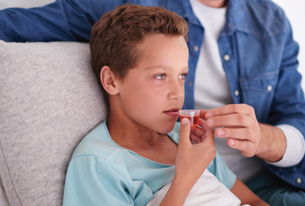By: Shanna McGinnis, MD, FAAP
Questions about medication are common, especially for first-time parents. “What do I give, how much, and how often?” “Can this medicine be taken with that medicine?” “This medicine tastes awful. How do I get my kid to take it?” “I don’t think this medicine is working. Can we stop giving it?” These are just a few questions this article will address in regards to giving medicine to children.
When it comes to measuring liquid medication, it is best to use a medicine cup or syringe. Never use a regular kitchen spoon used for eating. A device designed to measure medication is most accurate. If you don’t have one, ask the pharmacist if they can provide one or purchase one at the drugstore. Ideally, medication doses should be given in milliliters rather than teaspoons or tablespoons to allow for more accurate dosing.
To ensure that medication is given on a proper schedule, it is a good idea to write it down. This is especially helpful when more than one parent or caregiver is responsible for administering the drug. Placing a schedule on the refrigerator or using a sticky note on the bottle is a simple, yet effective system to avoid errors.
If you feel that a medicine is not working properly or are concerned about side effects, contact your child’s doctor before discontinuing. Some drugs must be tapered slowly. Stopping them abruptly may lead to more complications. Also, it may be necessary to prescribe an alternative treatment. Unless otherwise instructed, always complete the entire course of antibiotic therapy. Saving some for the next illness is not advised for several reasons. The medicine could expire, there will likely not be enough to treat that illness, and it may not even be the correct medication for next time.
If a prescription medicine tastes yucky, ask your pharmacist to add flavoring to it. You can also ask the pharmacist whether it is okay to mix the medicine with foods or beverages. In my experience, chocolate milk is great at masking icky flavors. When talking to your children, refer to medicine as medicine, not candy. Also, keep all medication out of their reach. The United States Consumer Product Safety Commission (CPSC) recommends locking up medicine. Although most bottles have child-resistant caps, they are not totally child-proof. Most children will eventually figure out how to open the container.
When choosing over-the-counter medicines, read the labels for ingredients, not just symptoms. Sometimes a medicine that is labeled for “cough” and one that is labeled for “runny nose” can contain the same active ingredients. Check with your doctor or pharmacist if you have questions about this. Also be sure to include herbal or natural remedies when asked to provide a medication list. These can sometimes interact with over-the-counter and prescription medicines.
Occasionally check the expiration dates on your medications and discard them as needed. The Drug Enforcement Administration (DEA) sometimes hosts “drug take back” events where people can safely disposed of unused, unwanted, or expired medicine. If you need to dispose of medicine at another time, the DEA recommends placing the medicine into a plastic bag with dirt, cat litter, or coffee grounds and throwing away in your household trash. Names and other personal information should be scratched off of the empty containers. You can visit fda.gov or dea.gov to get a list of medicines that can be safely flushed down the sink or toilet. These sites are great resources for general medication information.
Finally, if you have an adolescent who struggles with depression or other mental health concerns, it is important to keep medications in a secure location. Sometimes parents get more relaxed about securing medicines as kids get older. One of the most potentially lethal medications in our homes is acetaminophen or Tylenol. I encourage families to buy smaller, rather than larger, containers of medicine. The less that is around, the less likely someone is to be injured in the event of an overdose. This is one scenario where it may be worth skipping the “buy it in bulk bargain.”
The week of March 20th is National Poison Prevention Week. This would be a great time to review some “medication matters” in your home to ensure you are administering and storing your medications safely.

